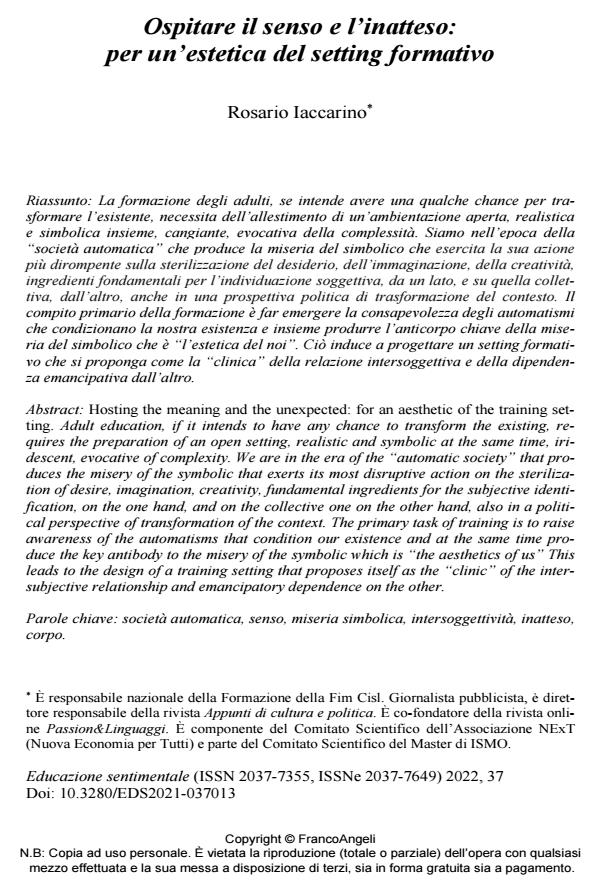Ospitare il senso e l’inatteso: per un’estetica del setting formativo
Journal title EDUCAZIONE SENTIMENTALE
Author/s Rosario Iaccarino
Publishing Year 2022 Issue 2022/37 Language Italian
Pages 10 P. 150-159 File size 248 KB
DOI 10.3280/EDS2022-037013
DOI is like a bar code for intellectual property: to have more infomation
click here
Below, you can see the article first page
If you want to buy this article in PDF format, you can do it, following the instructions to buy download credits

FrancoAngeli is member of Publishers International Linking Association, Inc (PILA), a not-for-profit association which run the CrossRef service enabling links to and from online scholarly content.
Hosting the meaning and the unexpected: for an aesthetic of the training setting. Adult education, if it intends to have any chance to transform the existing, requires the preparation of an open setting, realistic and symbolic at the same time, iridescent, evocative of complexity. We are in the era of the "automatic society" that produces the misery of the symbolic that exerts its most disruptive action on the sterilization of desire, imagination, creativity, fundamental ingredients for the subjective identification, on the one hand, and on the collective one on the other hand, also in a political perspective of transformation of the context. The primary task of training is to raise awareness of the automatisms that condition our exist-ence and at the same time produce the key antibody to the misery of the symbolic which is "the aesthetics of us" This leads to the design of a training setting that proposes itself as the "clinic" of the intersubjective relationship and emancipa-tory dependence on the other.
Keywords: automatic company, sense, symbolic misery, intersubjectivity, unex-pected, body
- Pörksen U. (2011). Parole di plastica. La neolingua di una dittatura internazionale. L’Aquila: Textus Edizioni.
- Ronchi R. (2007). Parlare in neolingua. Come si fabbrica una lingua totalitaria. In: M. Recalcati, a cura di, Forme contemporanee del totalitarismo. Torino: Bollati Boringhieri.
- Stiegler B. (2019). La società automatica. 1. L’avvenire del lavoro. Sesto S. Giovanni: Meltemi.
- Stiegler B. (2021). La miseria simbolica.1. L’epoca iperindustriale. Sesto S. Giovanni: Meltemi.
- Stiegler B. (2012). Reincantare il mondo. Il valore spirito contro il populismo industriale. A cura di P. Vignola. Napoli: Orthotes.
- Perniola M. (2004) Contro la comunicazione. Torino: Giulio Einaudi Editore.
- Pasolini P.P. (1962) L’epoca dell’alienazione. In: Vie Nuove, n. 19, 10 maggio 1962.
- Morin E. (2000). Insegnare a vivere. Manifesto per cambiare l’educazione. Milano: Raffaello Cortina Editore.
- Moreno C. (2014). Pedagogie erranti. In: C. Moreno, S. Parrello, I. Iorio, a cura di, La mappa e il territorio. Ripensare l’educazione fra strada e scuola. Palermo: Sellerio editore.
- Morelli U., Weber C. (1996). Passione e Apprendimento. Formazione-intervento: teoria, metodo, esperienze. Milano: Raffaello Cortina Editore.
- Merlini F. (2019). L’estetica triste. Torino: Bollati Boringhieri.
- Maturana H., Varela F. (1985). Autopoiesi e cognizione. Venezia: Marsilio.
- Masullo A.(2003). Paticità e indifferenza. Genova: Il Nuovo Melangolo.
- Massa R. (2001) La peste, il teatro, l’educazione. F. Antonacci e F. Cappa, a cura di. Milano: Franco Angeli.
- Magatti M. (2009). Libertà immaginaria. Le illusioni del capitalismo tecno-nichilista. Milano: Feltrinelli.
- Foucault M. (2006). Utopie. Eterotopie. Napoli: Edizioni Cronopio.
- Florenskij P. (2011). Stupore e dialettica. A cura di N. Valentini. Macerata: Quodlibet.
- Fellin E., Morelli U. (2020). Easy & Fast Training, Dalla formazione apparente alla formazione inesistente. In: Persone&Conoscenze, Gennaio 2020.
- Benasayag M. (2019). La tirannia dell’algoritmo. Milano: Vita e Pensiero.
Rosario Iaccarino, Ospitare il senso e l’inatteso: per un’estetica del setting formativo in "EDUCAZIONE SENTIMENTALE" 37/2022, pp 150-159, DOI: 10.3280/EDS2022-037013